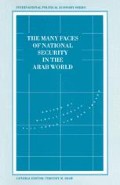Abstract
Prior to the 1990–91 Gulf War, three out of twenty-one Arab states possessed, or were developing, significant defence industries. These were Egypt, Iraq and Saudi Arabia. Of the three, Egypt has the longest-established industry, with a history of ambitious efforts at local design and development in such major areas as aircraft and ballistic missiles. Iraq was a newcomer, but under the pressure of combat needs during the first Gulf war (with Iran) it made rapid strides that brought it almost on a par with Egypt in terms of variety (except aircraft), volume and local content. In contrast, Saudi Arabia had only modest productive capabilities, but possessed the financial means to implement the broad plans it had under way for military industrialization.
Access this chapter
Tax calculation will be finalised at checkout
Purchases are for personal use only
Preview
Unable to display preview. Download preview PDF.
Notes
Exhaustively described in Anthony Cordesman, The Gulf and the Search for Strategic Stability (Boulder, Col. and London: Westview Press and Mansell, 1984).
Output according to Minister of State for Defence Production Gen. Jamal al-Sayyed, Al-Ahram (Cairo) 3 April 1988.
According to the head of the Egyptian Armaments Authority, Major General Muhammad Mustafa, al-Akram (Cairo) 20 August 1988.
For fuller discussions of the Egyptian arms industry, see Mohammad Selim, ‘Egypt’, in James Katz (ed.), Arms Production in Developing Countries (Lexington, Mass.: Lexington Books, 1984);
R. Vayrynen and T. Ohlson, ‘Egypt: arms production in the transnational context,’ in Michael Brzoska and Thomas Ohlson (eds), Arms Production in the Third World (London: Taylor and Francis, 1986);
and Michael Dunn, ‘Egypt: From Domestic Needs to Export Market,’ in James Katz ed., The Implications of Third World Military Industrialization: Sowing the Serpents’ Teeth (Lexington, Mass.: Lexington Books, 1986).
For example, see Qasim al-Oaqbi, al-Thawra (Baghdad) 11 October 1987. Import substitution is referred to specifically by Nabeel Ibrahim, ‘Muqawwimat al-sina’a al-harbiyyah’ [Basis of Military Industry], part 2, The Arab Researcher, 13 (October–December 1987) p. 78.
Statement by Planning Minister Kamal Ganzouri, Reuters, 28 June 1989.
According to then Defence Minister Abu Ghazalah, Jane’s Defence Weekly, 17 October 1987.
David Mares, ‘Mexico’s Challenges: Sovereignty and National Autonomy under Inter-dependence’, Third World Quarterly, 9, 3 (July 1987) p. 791.
As Saadet Deger argues in Military Expenditure in Third World Countries: The Economic Effects (London: Routledge & Kegan Paul, 1986) p. 172.
This is a point made in Subhi Qasim (ed.), Al-Waqi’ al-’arabi al-ilmi wa al-taqana wa bi’atih [Arab Science and Technology and their Environment] (Beirut: Centre for Arab Unity Studies, 1989) p. 185 (of the draft copy);
and Mary Kaldor, The Baroque Arsenal (London: Andre Deutsch, 1982) pp. 226–30.
Editor information
Editors and Affiliations
Copyright information
© 1993 Bahgat Korany, Paul Noble and Rex Brynen
About this chapter
Cite this chapter
Sayigh, Y. (1993). Arab Military Industrialization: Security Incentives and Economic Impact. In: Korany, B., Noble, P., Brynen, R. (eds) The Many Faces of National Security in the Arab World. International Political Economy Series. Palgrave Macmillan, London. https://doi.org/10.1007/978-1-349-22568-2_10
Download citation
DOI: https://doi.org/10.1007/978-1-349-22568-2_10
Publisher Name: Palgrave Macmillan, London
Print ISBN: 978-0-333-57222-1
Online ISBN: 978-1-349-22568-2
eBook Packages: Palgrave Political & Intern. Studies CollectionPolitical Science and International Studies (R0)

